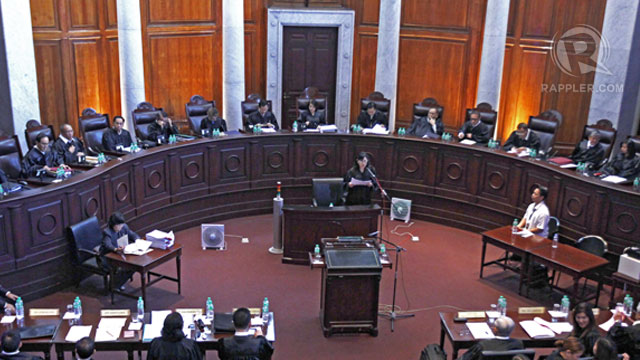SUMMARY
This is AI generated summarization, which may have errors. For context, always refer to the full article.

MANILA, Philippines – The executive and legislative branches of government are asking the Supreme Court to allow the release of their discretionary funds, which the court stopped on September 10 upon the petition of private citizens.
Represented by the Office of the Solicitor General (OSG), the Senate, the House of Representatives, and the Office of the President asked the court on Monday, September 23, to instead allow a “political” solution to controversies involving the utilization of the lawmakers’ Priority Development Assistance Fund (PDAF), the Malampaya Fund, and the President’s Social Fund (PSF).
The 3 separate complaints that prompted the issuance of a TRO were filed by former senatorial candidates Greco Belgica and Samson Alcantara and by Pedrito Nepomuceno.
In a 23-page consolidated comment, Solicitor General Francis Jardeleza asked the SC to partially lift the TRO, citing the welfare of lawmakers’ scholars and healthcare beneficiaries.
“Considering the foreseeable damage to our scholars and ailing, indigent citizens who rely on the PDAF for public assistance if the Honorable Court continues to enjoin the release of the entire PDAF remaining in 2013,” he said.
READ: Scholars, patients? DepEd, DOH get least of realigned PDAF
Jardeleza said 95 lawmakers currently have 412,078 scholars who may need to quit school if the PDAF is withheld.
He pointed out too that from 2010 to 2013, a total of 807,372 indigent patients received treatment with the help of lawmakers’ PDAF, and thousands could therefore be denied medical assistance without the pork barrel.
Because of this, he said, “respondents vehemently urge the Honorable Court, for humanitarian considerations, to partially lift its TRO on the PDAF in order that such appropriation may be used even if only for the limited and specific purpose of funding existing scholarships an providing medical assistance to indigent patients.”
Political, not constitutional, issue
Jardeleza also asked the Court to dismiss the consolidated petitions seeking the abolition of the PDAF.
He said anomalies in the disbursements of PDAF is “political problem,” and therefore not for the High Court to resolve.
“The reported abuses of the PDAF are problems of implementation; they do not go into the constitutionality of the law, as defined by this Honorable Court’s existing jurisprudence. Under the constitutional structure of our government, the remedy lies elsewhere; prosecution by the Executive or the Ombudsman, or through the political process, by means of a statutory amendment,” Jardeleza added.
The administration, he said, is already putting in place reforms in the budget process to have enough safeguards against the misuse of the pork barrel.
READ: Budget hearing? Drilon grills SC on ‘pork’ TRO
In defense of President’s ‘pork’
Jardeleza also dismissed the claim of petitioners that the Malampaya Fund and the PSF do not undergo the scrutiny of legislators through the budget process.
These two funds, he said, are special accounts created by law and generated from particular revenue streams – the operation of the Malampaya natural gas project and the Philippine Amusement and Gaming Corporation, respectively.
Jardeleza argued that Congress has the constitutional authority to create special funds and there is no constitutional basis to compel the executive to include “off-budget” items in the General Appropriations Act (GAA).
“These off-budget items are constitutionally subject to the transparency and accountability measures of the Constitution,” the Solicitor General said.
The disbursement of these funds follow “well-defined standards” in the use of public funds for public purpose, he said.
It is far from being a “running riot,” as the petitioners called the utilization of the funds, Jardeleza said “the exercise of Presidential discretion is safely canalized within banks that keep it from overflowing.”
Upheld before
As for the lawmakers’ pork barrel, Jardeleza said such allocation was declared constitutional by the Supreme Court in 1994, when it was still called the Countrywide Development Fund (CDF) in the case of Philconsa v. Enriquez.
The High Court upheld the authority of the members of Congress to propose and identify priority projects to be funded by the CDF.
In 2000, the appropriation was renamed PDAF and was questioned two more times before the SC – in Sarmiento v. Treasurer and in LAMP v. Secretary of Budget and Management.
In the earlier case, the allocation was sustained as constitutional. In the latter case, the SC dismissed the petition, saying that there was no convincing proof that the funds were ever directly released to members of Congress and spent without checks and balances. – Rappler.com
Add a comment
How does this make you feel?
There are no comments yet. Add your comment to start the conversation.